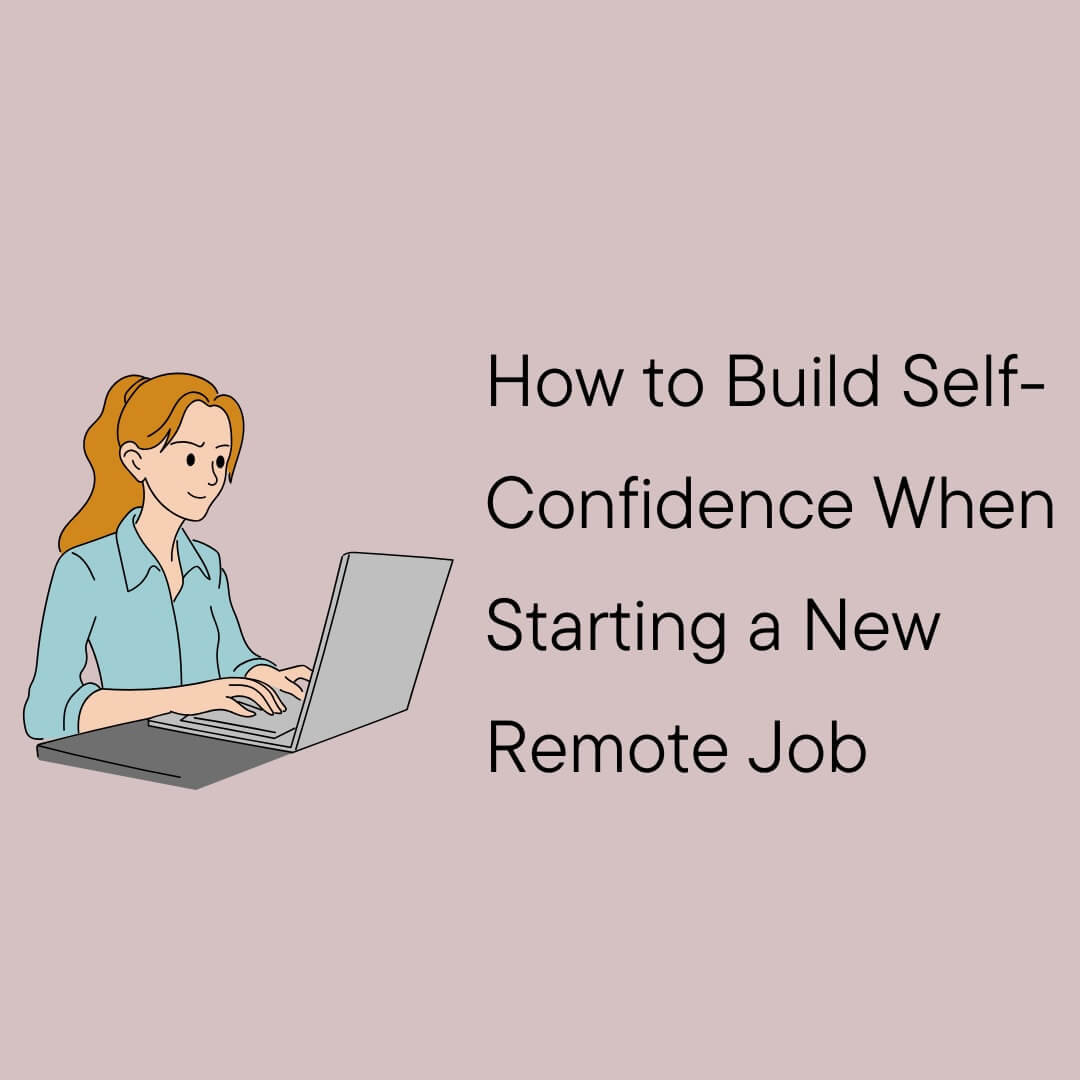Starting a new job can be nerve-wracking, but stepping into a new remote role comes with its own unique challenges. Without face-to-face interactions, in-person onboarding, or the buzz of an office environment, it’s easy to feel isolated or unsure of yourself. But here’s the good news—building self-confidence in a remote job is completely doable. In fact, it can become one of your greatest strengths.
Whether you’re new to the workforce, changing careers, or simply switching to a fully remote setup, this guide will help you build self-confidence from day one. Let’s dive into practical, actionable steps that will help you thrive in your new remote role.
Why Self-Confidence Matters in a Remote Job
Before we get into the how, let’s talk about the why. Confidence isn’t just about feeling good—it directly impacts how others perceive you, how well you communicate, and your ability to problem-solve independently. In a remote job, where you’re often working autonomously and may have fewer real-time interactions with your team, confidence is your anchor.
Here’s what confidence can help you do in a remote role:
- Take initiative without constant supervision
- Communicate clearly and assertively in meetings and written messages
- Ask for help or feedback when needed
- Build strong working relationships virtually
- Trust your own decision-making
The more confident you are, the more likely you are to succeed—and enjoy your work.
-
Start With a Confident Mindset
Your mindset shapes your reality—especially when starting a new remote job or launching your own business. Feeling nervous is normal, but remember this: you were hired for a reason, or you decided to start a business because you knew you had what it takes. Your skills, professional experience, and potential stood out, whether to an employer or to yourself.
Starting a remote role or becoming an entrepreneur is a big step—but it’s already a win. Trust the abilities that brought you here. Confidence, resilience, and the right mindset are key to thriving in any new professional journey, especially in today’s digital workspace.
Action Steps:
- Remind yourself of your wins. Keep a list of achievements from past roles, school, or personal projects.
- Reframe self-doubt. When you catch yourself thinking, “I don’t know what I’m doing,” reframe it to, “I’m learning something new, and that takes time.”
- Visualize success. Spend 5 minutes a day visualizing yourself confidently handling meetings, solving problems, and thriving in your role.
-
Master Your Remote Setup
Confidence starts with comfort. If your physical and digital workspace is chaotic or unreliable, it will chip away at your focus and self-assurance. Investing time in setting up a smooth remote workflow can boost both productivity and peace of mind.
Action Steps:
- Create a dedicated workspace. Even a small, tidy corner can signal “work mode” to your brain.
- Check your tech. Make sure your internet connection, webcam, microphone, and work software are all functioning well.
When everything’s in place, you’ll naturally feel more in control.
-
Get Comfortable With Over-Communicating
In remote jobs, communication is your superpower. Since you’re not bumping into colleagues in the hallway or picking up on body language, clarity and consistency are key.
Action Steps:
- Ask questions early. Don’t wait for uncertainty to grow—most managers appreciate proactive questions.
- Use multiple channels. Don’t hesitate to confirm things in writing, over chat, or during a call if needed.
- Give regular updates. Even if your manager doesn’t ask, checking in with progress shows initiative and builds trust.
Over-communicating (in a professional way) not only helps your team—it boosts your confidence in how you’re contributing.
-
Set Small, Achievable Goals
Confidence is built through momentum. When you set and accomplish small goals, you prove to yourself that you’re capable—even if you’re still learning the ropes.
Action Steps:
- Break tasks into bite-sized steps. Instead of “finish project,” make your goal “write project outline today.”
- Track your progress. Use a planner or digital tracker to see how far you’ve come.
- Celebrate wins. Whether it’s mastering a tool or getting praise in Slack, give yourself credit.
Progress—no matter how small—is the fastest way to replace fear with confidence.
-
Build Relationships Intentionally
It’s easy to feel isolated in a remote role, especially if you don’t know your coworkers well. Building relationships—even virtually—can improve morale, reduce imposter syndrome, and boost confidence.
Action Steps:
- Attend optional meetings or coffee chats. These are great for informal bonding.
- Start conversations. Drop a “How was your weekend?” in a Slack thread—it can go a long way.
- Find a work buddy. Having one go-to person for questions and casual chats can make all the difference.
When you feel connected, you’ll feel more supported—and that support helps you believe in yourself.
-
Learn the Culture (and Fit Into It Authentically)
Company culture isn’t always easy to read remotely, but understanding it will help you navigate your new environment with more confidence. It also helps you show up authentically and professionally.
Action Steps:
- Observe communication styles. Are people more formal or relaxed in messages? Do they prefer video calls or async updates?
- Engage with internal channels. Join Slack groups, participate in team-building activities, or comment on internal posts.
- Ask for a culture rundown. Your manager or HR may have resources or tips for fitting in.
Being culturally aware helps you avoid awkward moments—and lets your best self shine.
-
Keep Learning and Asking for Feedback
Confidence comes from competence. And competence grows through learning and feedback. The more you invest in growing your skills, the more comfortable and confident you’ll feel in your role.
Action Steps:
- Block time for learning. Dedicate 30 minutes a few times a week to read documentation, watch tutorials, or improve your craft.
- Ask for feedback early. You don’t have to wait for a performance review. Try: “Is there anything I could improve on?”
- Take feedback as fuel. Instead of seeing it as criticism, treat it as valuable insight for growth.
The most confident people aren’t the ones who know everything—they’re the ones who stay curious and open.
-
Practice Self-Compassion
You’re human. You’re going to make mistakes. You’re going to feel unsure sometimes. And that’s okay. The key to long-term confidence is learning how to support yourself instead of tearing yourself down.
Action Steps:
- Talk to yourself like a coach. Would you call a teammate “useless” for making a mistake? No—and you shouldn’t do it to yourself, either.
- Take breaks. Mental fatigue makes self-doubt louder. Rest keeps your mind sharp and your confidence high.
- Focus on progress, not perfection. Being remote doesn’t mean being flawless. You’re learning, adapting, and growing—and that’s enough.
Self-confidence isn’t about being perfect. It’s about showing up, trying, and being kind to yourself as you go.
-
Improve Your Skills
No matter what field you’re in, constantly improving your skills is essential for long-term success. For instance, if you’re working as a consultant, staying updated on the latest trends, tools, and best practices in your industry is crucial. Enhancing your communication skills—such as using confident body language and maintaining a professional appearance—can also make a significant difference. The more expertise you develop in your area of work, the more confident, credible, and effective you’ll be in your role.
Action Steps:
Stay Informed by Subscribing to Industry Newsletters Regularly consuming industry-specific content is one of the most effective ways to stay ahead of new trends, tools, and best practices. By subscribing to a few key newsletters, you can ensure that you’re constantly learning and adapting to changes in your field.
Keep Learning with Webinars and Workshops To stay competitive, it’s important to regularly engage in learning opportunities such as webinars, online courses, and workshops. These sessions provide valuable insights into the latest industry trends and can enhance your skills.
Prioritize Your Morning Grooming Routine for a Professional Image First impressions matter, especially in professional settings. A well-thought-out morning routine ensures that you’re always presenting your best self. Personal grooming not only boosts your confidence but also helps you maintain a professional appearance throughout the day.
Starting a new remote job is a bold move—and one that takes courage. Building self-confidence in this environment doesn’t happen overnight, but with intention and the right habits, you’ll grow faster than you think.
Remember, confidence is a skill—just like time management or public speaking. The more you practice, the stronger it gets.
So go ahead. Own your new role, trust your abilities, and give yourself the space to thrive. You’ve got this.
Key Takeaways:
- Confidence in a remote job starts with mindset and preparation.
- Over-communication builds clarity and trust.
- Small wins, relationship-building, and feedback fuel long-term growth.
- Self-compassion and consistency will take you further than perfection ever could.
Frequently Asked Questions (FAQs)
- How long does it take to feel confident in a new remote job?
It varies, but most people begin to feel more confident after 3–6 weeks, especially when they take initiative, ask questions, and track progress. - What if I’m naturally shy or introverted?
You don’t need to be extroverted to be confident. Confidence comes from preparation, self-trust, and clear communication—traits introverts can excel at. - Is it okay to make mistakes in a new remote role?
Absolutely. Mistakes are part of learning. How you respond—by asking questions, adjusting, and trying again—is what really matters.


